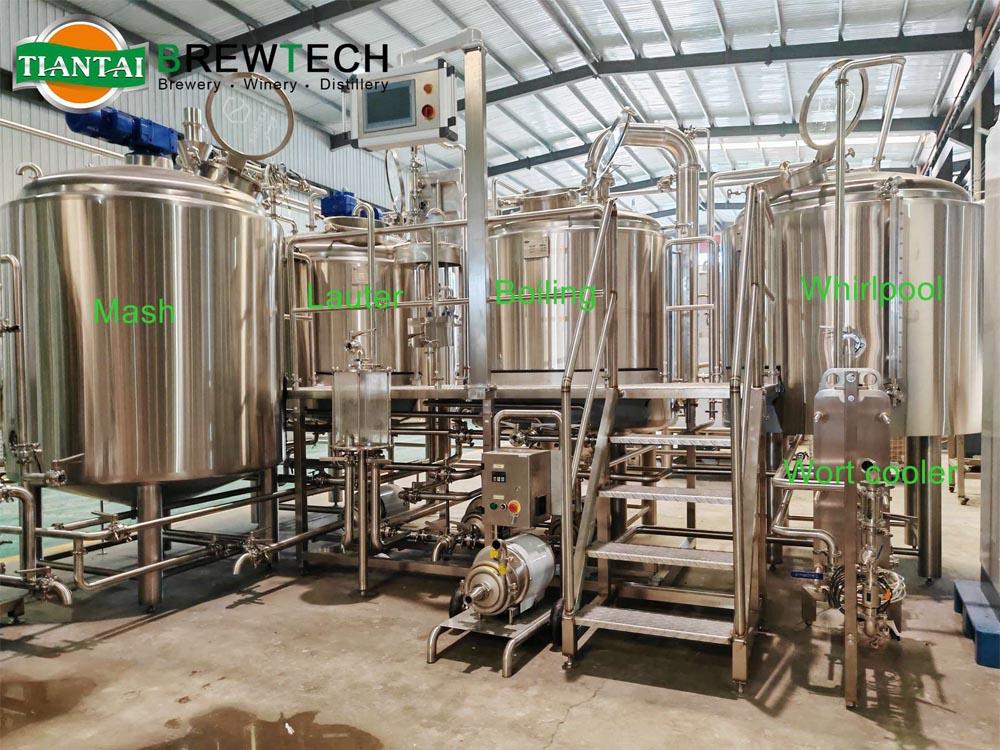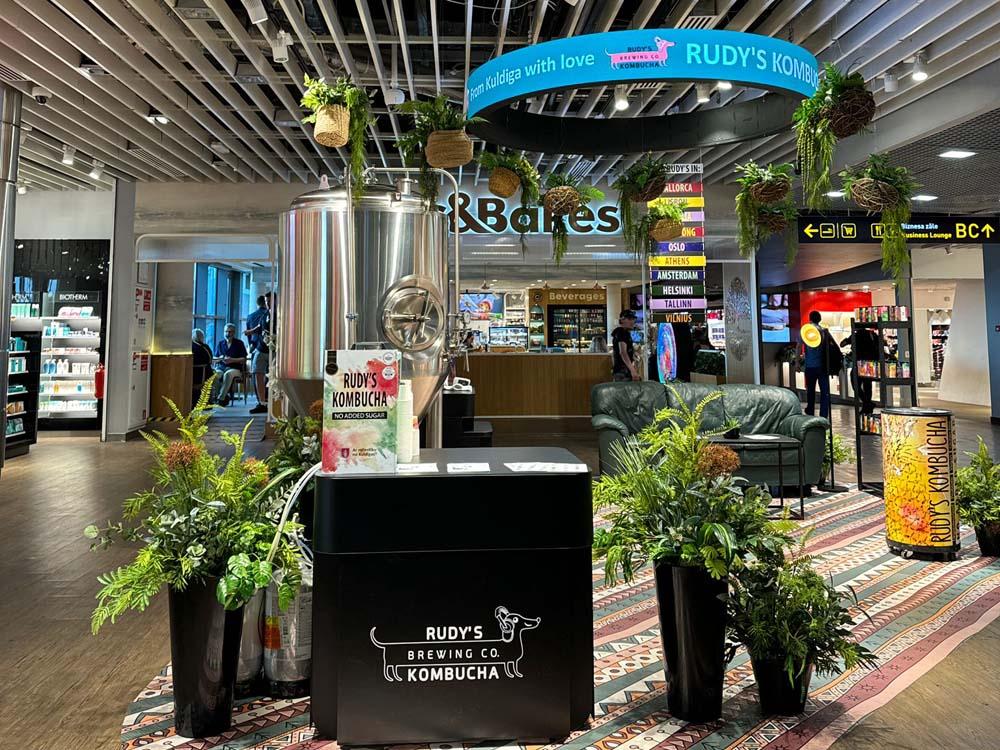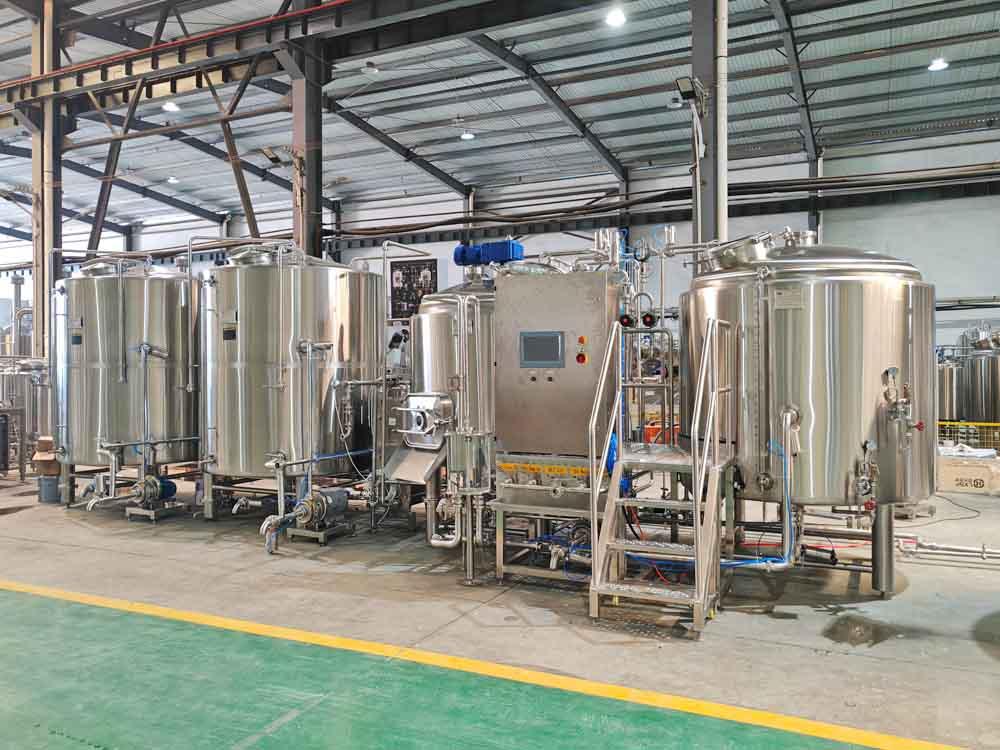Regarding the beer mashing process
- Aug 31, 2024
- 102
- tiantai
To invest a new brewery, there are much things need consideration. Actually, for many of our customers, they are also beginner in this business. For beer equipment design, also know very less. Today, let’s start our knowledge post one by one. In beer brewing, mashing is generally 1st step, which will happen in mash tun. In this article, we discuss what we need know for beer mashing process.
Understanding the beer mashing process is critical for achieving consistent and high-quality beer. Here are key aspects to know about the mashing process:
1. Mashing Goals
Extract Sugars: The primary goal of mashing is to convert the starches in malt into fermentable sugars. These sugars are essential for the fermentation process and contribute to the beer’s alcohol content and flavor.
2. Ingredients
Malt: Malted barley or other grains are used as the primary source of starches and enzymes. The choice of malt affects the flavor, color, and body of the beer.
Water: Water is mixed with the malt to create the mash. The quality and mineral content of water can influence the mashing process and the final beer.
3. Mashing Process
Mash Tun: The vessel where mashing occurs. It needs to maintain a stable temperature and allow for proper mixing.
Temperature Control: Mashing involves specific temperature steps (such as 60-65°C for protein rest and 65-72°C for saccharification) to activate different enzymes. Accurate temperature control is crucial for efficient enzyme activity and optimal sugar extraction.
Mash Duration: The duration of mashing affects the efficiency of sugar extraction. Typical mashing times range from 60 to 90 minutes.
4. Enzymes
Alpha-Amylase: Breaks down large starch molecules into smaller dextrins and sugars. Active at temperatures around 68-72°C.
Beta-Amylase: Converts dextrins into fermentable sugars (maltose). Active at temperatures around 60-65°C.
Protease: Breaks down proteins to prevent haze formation and improve beer clarity.

5. pH Levels
Mash pH: The pH of the mash should be monitored and adjusted as needed. The ideal pH range is typically between 5.2 and 5.6. Proper pH levels ensure optimal enzyme activity and prevent extraction of undesirable compounds.
6. Mash Mixing
Uniformity: Proper mixing of malt and water is essential to achieve a homogeneous mash and ensure even extraction of sugars.
Consistency: Ensure the mash is well-mixed to avoid dry spots or clumps of unmixed malt.
7. Mash Separation
Lautering: After mashing, the wort (liquid) needs to be separated from the solid grain husks. Efficient lautering is critical to maximize sugar extraction and minimize wort loss.
Vorlauf: The process of recirculating the wort to clarify it before collecting the final runnings.
8. Efficiency
Extract Efficiency: The percentage of available sugars extracted from the malt. Higher efficiency means more fermentable sugars are recovered, leading to better beer yield.
Rinsing: Sparging, or rinsing the grain bed with hot water, helps to extract additional sugars that were not initially dissolved.
9. Troubleshooting
Stuck Mash: If the mash becomes too thick or blocks the flow of wort, it can be due to high grain viscosity or improper mixing. Adding more water or adjusting temperature can help.
Inconsistent Temperatures: Temperature fluctuations can affect enzyme activity and sugar extraction. Ensure that the mash tun is properly insulated and temperature is monitored closely.
10. Post-Mashing Steps
Mash-out: Raising the temperature of the mash to around 76-78°C before lautering helps to improve wort flow and enzyme inactivation.
Wort Quality: The quality of the wort collected after mashing impacts the final beer. It should be clear, with minimal unwanted compounds.
Conclusion
Knowing these aspects of the mashing process helps ensure that you achieve optimal sugar extraction, maintain proper enzyme activity, and produce high-quality wort. Mastery of mashing contributes significantly to the overall quality and consistency of the beer.
Welcome to contact Nicole at [email protected] to customize your beer brewing equipment. Let us assist you in setting up a functional brewery. Cheers!
Edited by Nicole
Sales manager | Tiantai beer equipment
Email: [email protected]
Understanding the beer mashing process is critical for achieving consistent and high-quality beer. Here are key aspects to know about the mashing process:
1. Mashing Goals
Extract Sugars: The primary goal of mashing is to convert the starches in malt into fermentable sugars. These sugars are essential for the fermentation process and contribute to the beer’s alcohol content and flavor.
2. Ingredients
Malt: Malted barley or other grains are used as the primary source of starches and enzymes. The choice of malt affects the flavor, color, and body of the beer.
Water: Water is mixed with the malt to create the mash. The quality and mineral content of water can influence the mashing process and the final beer.
3. Mashing Process
Mash Tun: The vessel where mashing occurs. It needs to maintain a stable temperature and allow for proper mixing.
Temperature Control: Mashing involves specific temperature steps (such as 60-65°C for protein rest and 65-72°C for saccharification) to activate different enzymes. Accurate temperature control is crucial for efficient enzyme activity and optimal sugar extraction.
Mash Duration: The duration of mashing affects the efficiency of sugar extraction. Typical mashing times range from 60 to 90 minutes.
4. Enzymes
Alpha-Amylase: Breaks down large starch molecules into smaller dextrins and sugars. Active at temperatures around 68-72°C.
Beta-Amylase: Converts dextrins into fermentable sugars (maltose). Active at temperatures around 60-65°C.
Protease: Breaks down proteins to prevent haze formation and improve beer clarity.

5. pH Levels
Mash pH: The pH of the mash should be monitored and adjusted as needed. The ideal pH range is typically between 5.2 and 5.6. Proper pH levels ensure optimal enzyme activity and prevent extraction of undesirable compounds.
6. Mash Mixing
Uniformity: Proper mixing of malt and water is essential to achieve a homogeneous mash and ensure even extraction of sugars.
Consistency: Ensure the mash is well-mixed to avoid dry spots or clumps of unmixed malt.
7. Mash Separation
Lautering: After mashing, the wort (liquid) needs to be separated from the solid grain husks. Efficient lautering is critical to maximize sugar extraction and minimize wort loss.
Vorlauf: The process of recirculating the wort to clarify it before collecting the final runnings.
8. Efficiency
Extract Efficiency: The percentage of available sugars extracted from the malt. Higher efficiency means more fermentable sugars are recovered, leading to better beer yield.
Rinsing: Sparging, or rinsing the grain bed with hot water, helps to extract additional sugars that were not initially dissolved.
9. Troubleshooting
Stuck Mash: If the mash becomes too thick or blocks the flow of wort, it can be due to high grain viscosity or improper mixing. Adding more water or adjusting temperature can help.
Inconsistent Temperatures: Temperature fluctuations can affect enzyme activity and sugar extraction. Ensure that the mash tun is properly insulated and temperature is monitored closely.
10. Post-Mashing Steps
Mash-out: Raising the temperature of the mash to around 76-78°C before lautering helps to improve wort flow and enzyme inactivation.
Wort Quality: The quality of the wort collected after mashing impacts the final beer. It should be clear, with minimal unwanted compounds.
Conclusion
Knowing these aspects of the mashing process helps ensure that you achieve optimal sugar extraction, maintain proper enzyme activity, and produce high-quality wort. Mastery of mashing contributes significantly to the overall quality and consistency of the beer.
Welcome to contact Nicole at [email protected] to customize your beer brewing equipment. Let us assist you in setting up a functional brewery. Cheers!
Edited by Nicole
Sales manager | Tiantai beer equipment
Email: [email protected]




